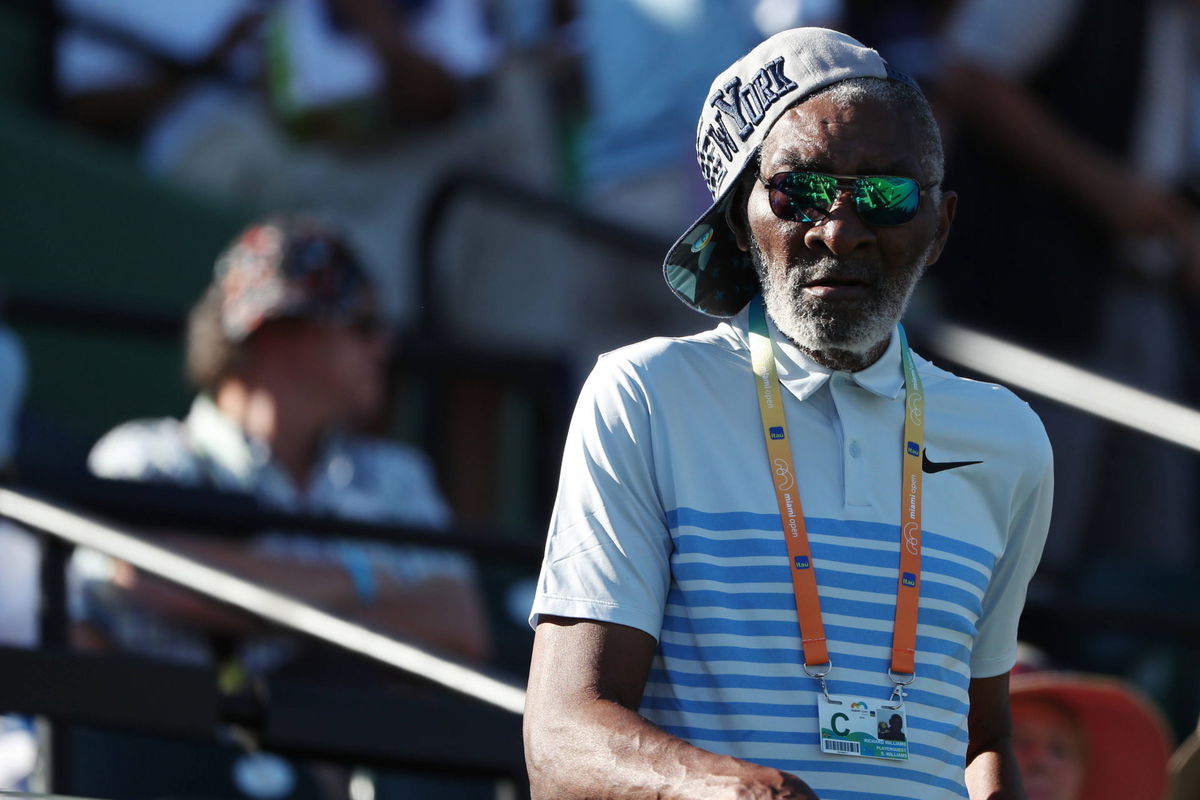
USA Today via Reuters
Tennis: Miami Open, Mar 21, 2018 Key Biscayne, FL, USA Richard Williams, father of Serena Williams of the United States not pictured, looks on from the stands against Naomi Osaka of Japan on day two of the Miami Open at Tennis Center at Crandon Park. Osaka won 6-3, 6-2. Mandatory Credit: Geoff Burke-USA TODAY Sports, 21.03.2018 17:23:16, 10723883, NPStrans, Naomi Osaka, tennis, Serena Williams, United States, Crandon Park, Japan, Richard Williams PUBLICATIONxINxGERxSUIxAUTxONLY Copyright: xGeoffxBurkex 10723883

USA Today via Reuters
Tennis: Miami Open, Mar 21, 2018 Key Biscayne, FL, USA Richard Williams, father of Serena Williams of the United States not pictured, looks on from the stands against Naomi Osaka of Japan on day two of the Miami Open at Tennis Center at Crandon Park. Osaka won 6-3, 6-2. Mandatory Credit: Geoff Burke-USA TODAY Sports, 21.03.2018 17:23:16, 10723883, NPStrans, Naomi Osaka, tennis, Serena Williams, United States, Crandon Park, Japan, Richard Williams PUBLICATIONxINxGERxSUIxAUTxONLY Copyright: xGeoffxBurkex 10723883
Hobbies are not just a part of life but a reason to live. During the days when Venus and Serena Williams were preparing themselves to rule the sport, it was King Richard who would drive them to the courts. Although both the sisters now have plenty of amenities and luxury vehicles, and their own schedules to stick with, their father is still in love with the driving seat. Even after being pulled over lately, he is persistent in not giving up on revving the machines.
Watch What’s Trending Now!
Known to many as “King Richard” and the father of tennis legends Serena and Venus Williams is currently facing significant health challenges. His health has deteriorated to a notable extent in recent years, leading to issues in his speech and mental capacity. However, despite these issues, Richard remains determined not to give up driving, the only passion that he has held onto.
In an interview with The SUN, Chavoita LeSane(Richard’s son), acknowledged his love for vehicles, saying, “My dad loves to drive, it’s his passion. He would never give up his license. It will be a sad day for him when he’s unable to pass the test.“
ADVERTISEMENT
Although this might seem within the limits, recent events point to an unexpected reality. On July 12, police in Palm Beach, Florida, pulled Richard over for speeding. He was driving his new silver Volkswagen truck at 44mph in a 35mph zone and therefore received a violation caught by a police laser gun. This resulted in a $131 fine, along with being exposed to the media. However, the law is kind enough to not force Richard to appear in court.
Serena Williams' dad Richard, 82, refuses to give up driving despite a fine https://t.co/gWh81OMXpx
— Abdul Wahid (@Abdul248Abdul) August 17, 2024
During the time of his divorce proceedings with Lakeisha Graham, Richard’s primary care physician, Dr. Monica Walker, came forward to express concern over his driving abilities. In a letter to the court, she clearly suggested that he should be away from the roads. “You have had problems with driving and directions… You are advised not to drive because you do not have the ability to do this,” the specialist said.
ADVERTISEMENT
Despite these warnings, Williams sisters’ father’s family insisted that his health had improved. Chavoita mentioned, “The doctors in Miami did an amazing job, especially with his neuralgia/brain surgery… He drives again now and cares for himself mostly, he’s truly blessed.“
Richard, who has about a year and a half until his license needs renewal, is firm on his decision to continue driving as he showcases similar levels of determination that defined his career as a coach and father. However, quite on the contrary, there was a time when Serena had to step forward to bring her fear of driving through the streets to light.
ADVERTISEMENT
When Serena Williams reflected on her fear of driving through the streets
In 2016, Serena shared an emotional experience that highlighted her deep concerns about race and policing in America. She narrated an incident when she let her 18-year-old nephew drive her to meetings so that she could safely use her phone in the car. What seemed like a regular decision quickly became a source of intense anxiety for the tennis pro. As they cruised through the streets, she noticed a police officer on the side of the road, and this instantly triggered a wave of concern in her mind.
Serena explained her thoughts in a Facebook post, saying, “I quickly checked to see if he was obliging by the speed limit.” The sight of the officer reminded her of a tragic incident where a woman’s boyfriend was shot by a police officer during a routine traffic stop. This memory flooded her mind and in just a few seconds the American found herself surrounded by worries for her nephew’s safety. “All of this went through my mind in a matter of seconds,” she wrote, revealing the levels of her fear.
ADVERTISEMENT
Serena even expressed regret over not driving herself because of the initial desire to focus on her phone. She admitted, “I would never forgive myself if something happened to my nephew.” This moment of vulnerability and fear gave out the harsh reality that many Black Americans face in the United States where even routine activities like driving could be connected with anxiety and concern for personal safety. Although things have drastically changed now road concerns still emerge, but her father refuses to let go of the activity.
Top Stories
26-Year-Old Tennis Journalist Meets Tragic Demise After Battling Brutal Chronic Disease

ESPN Ditches Coco Gauff, Jannik Sinner’s Coaches for Chris Evert After 2 Decades

Coco Gauff Surprises Stefanos Tsitsipas’ Brother After He Calls Her Out at United Cup

17-Year-Old Aussie Shocks 4x WTA Title Winner at Brisbane International

Stefanos Tsitsipas Stuns Injured Taylor Fritz to End Almost Two Year Drought

ADVERTISEMENT
ADVERTISEMENT
ADVERTISEMENT

